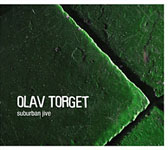Home » Jazz Articles » Album Review » Olav Torget: Suburban Jive
Olav Torget: Suburban Jive
That's not to say Torget's music lacks depth. From the opening, Steve Reich-like layered guitar pulses of "Resonant Pattern," it's clear that Torget is aiming for his own kind of stylistic melting pot. The repetitive pattern evolves as percussionist Helge Norbakken enters and layers a tribal pulse while Torget injects a simple melody. While there's clear form, improvisation is an equal part as trumpeter Per Willy Aaserud solos with a Miles Davis-informed mute before the tune takes a left turn into near-fusion territory, Torget kicking in the overdrive for a fiery solo that still avoids all trappings of excess.
Guests appear on all nine tracks, but its Torget's multi-instrumentalism that creates Suburban Jive's rich soundscape. In addition to guitars, bass, keyboards and percussion, Torget plays the African konting (five-string lute) and Chinese Moon Guitar (a four-string fretted instrument) which, in addition to the wealth of hand percussion from Norbakken, Harald Skullerud and Kossa Diomande, and Solo Cissokho's harp-like West African kora, gives Suburban Jive a surprisingly unurban complexion. The blues-centric "Grit" features Torget on konting, yet takes on an unexpected feel with Halvor Voldstad's multi-tracked trombone horn section. All the songs are by Torget alone or in collaboration with his guests, with the exception of the traditional Senegalese "Gilli," rearranged to both retain an ethnic feel through the combination of Skullerud's hand percussion and Torget's konting and wordless vocals, while adding a more modern touch with the distorted keyboard of its intro.
The majority of Suburban Jive avoids stereotypical Nordic cool, but on "Some Things are Yet to Come" Seim's economical playing—focusing, Jan Garbarek-like, on purity of tone—evokes images of stark vistas, despite Cissokho's kora and Norbakken's spare percussion. Torget introduces more sophisticated harmonies on the ambling "Five to Six (in the morning)," soloing with a clean tone and attention to singable themes rather than pyrotechnics.
Avoidance of standard guitar posturing seems, in fact, to be a defining characteristic for Torget. Rather than impressing with technique, it's his organic cultural integration combined with a keen sense of texture, polyrhythm and form, making Suburban Jive a debut that highlights an artist well worth watching.
Track Listing
Resonant Patterns; Five to Six (in the morning); Grit; Song for Marte; Yadoh Drums; A Little While; Quiet Saturday; Gilli; Some Things are Yet to Come.
Personnel
Olav Torget: guitars, konting, Chinese moon guitar, bass, keyboards, additional percussion, occasional humming; Helge Norbakken: percussion (1, 2, 4, 7, 9); Harald Skullerud: percussion (3, 6, 8); Kossa Diomande: percussion (5); Per Willy Aaserud: trumpet (1, 2, 4, 7); Halvor Voldstad: trombone (3); Trygve Seim: saxophone (9); Solo Cissokho: kora (9).
Album information
Title: Suburban Jive | Year Released: 2008 | Record Label: Echofisk
< Previous
Just This Once
Next >
Trace A River
Comments
Tags
For the Love of Jazz
 All About Jazz has been a pillar of jazz since 1995, championing it as an art form and, more importantly, supporting the musicians who create it. Our enduring commitment has made "AAJ" one of the most culturally important websites of its kind, read by hundreds of thousands of fans, musicians and industry figures every month.
All About Jazz has been a pillar of jazz since 1995, championing it as an art form and, more importantly, supporting the musicians who create it. Our enduring commitment has made "AAJ" one of the most culturally important websites of its kind, read by hundreds of thousands of fans, musicians and industry figures every month.



















